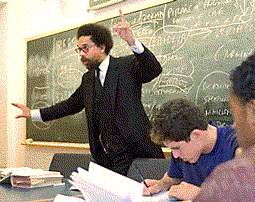|
 |
|
|
Cornel West captures the attention of students in his freshman seminar as he discusses Plato's "Republic." He said the seminars are a prime example of the University's commitment to high-quality undergraduate education. |
West scribbled Greek words such as parrhesia and paideia on the board, read aloud from a worn hardcover book and made eye contact with every student in the room. As he talked about a text written more than 2,000 years ago, he weaved references to jazz artists and stand-up comics into the discussion and gracefully moved the students through Plato's words with the agility of a ballet dancer.
"Plato began as a tragic dramatist and a comic dramatist; he is a follower of Homer and Aeschylus. And the story goes -- and we don't know if it was actually true or not -- that he was on his way with his plays to compete (in a play writing contest) and he encounters Socrates, and what happens? He's infected with perplexity. He goes home and burns all his plays, and he says, 'I want to be a philosopher.'"
The class is titled "The Tragic, the Comic and the Political," a freshman seminar that explores how philosophers, poets and dramatic artists have responded to the problem of evil. The reading list for the class, which meets for three hours once a week, includes Sophocles' "Antigone," Dante's "Inferno," Kafka's "The Metamorphosis," Chekhov's "Three Sisters" and Beckett's "Waiting for Godot."
"If it weren't for his energy, we couldn't do this for three hours," said student Kean Tonetti. "In the first class he got us so excited about reading these books. I think everyone in the class was just blown away."
And West is delighted with the opportunity to teach freshmen during his first semester back at Princeton, where he was a faculty member from 1988 to 1994. "I love to teach young people. I've always taught freshmen and sophomores throughout my 26 years of teaching, but this is the first time I have had a seminar of freshmen only, and I just love it. You can see the wonderful give and take -- freshmen are just so special."
West sees classes like the freshman seminar as one of the University's strengths. "One thing that's so great about Princeton is that it's fundamentally committed to a high-quality undergraduate education, which means that well-known professors wrestle with the young folks for three hours," he said.
More than 100 students applied to be in West's class of 15, but the acclaimed teacher and religion scholar said he expects it will be the texts, not his lectures, that will bewitch the students this semester. "Once you're reading Plato, Dante, 'The Iceman Cometh' . . . well, I'll give my lecture, but I don't really have to. (Eugene) O'Neill is going to put them in such a swirl. That is what great, powerful writing does."
During the class, West discussed at length the theme of loss that suffuses "Republic," as Plato struggles to cope with the evil that allowed his mentor, Socrates, to be put to death. The next time they met, the students moved on to Plato's "Symposium," though West acknowledged that one could easily grapple with "Republic" for a few semesters.
"This is a first exposure for them, an initial wrestling," he said. "They are seeing so many crucial things at work, with implications that they will not be able to recognize until they're juniors, seniors or graduate students." Tackling "Republic" at this stage in their educations served a broader purpose. "The aim of the text," West told the class, "is to get every one of us in this room, you and me, to think for ourselves."